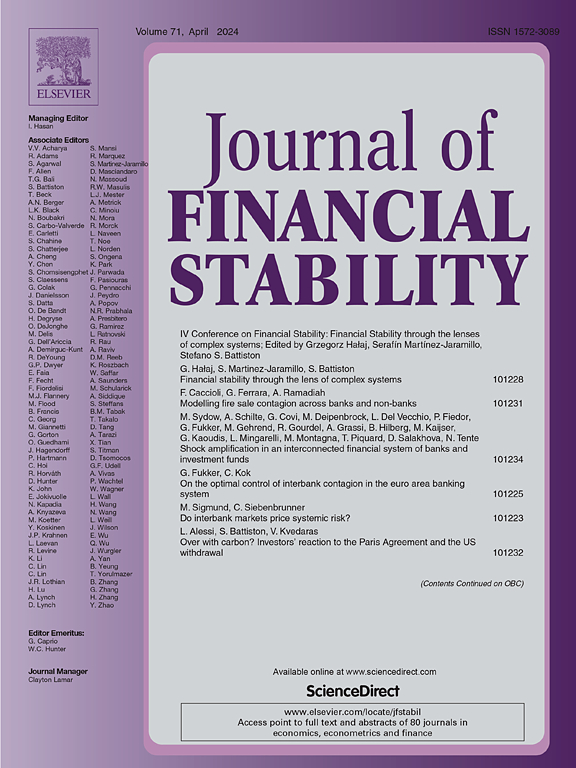Geopolitical risk and corporate maturity mismatch
IF 6.1
2区 经济学
Q1 BUSINESS, FINANCE
引用次数: 0
Abstract
This paper explores how geopolitical risk affects corporate maturity mismatch using a sample of Chinese listed corporations. We find that geopolitical risk significantly exacerbates corporate maturity mismatch. Specifically, GPR increases corporate long-term investment and short-term debt, while decreasing corporate short-term investment and long-term debt. Further, the impact of GPR is amplified by R&D investment, industry competitiveness, and financial constraint, but weakened by corporate credit quality. The results of the mechanism test suggest that geopolitical risk exacerbates corporate maturity mismatch by increasing corporate information asymmetry and default risk. Additionally, we find that the impact of GPR on corporate maturity mismatch exhibits industry heterogeneity, and the positive effect of geopolitical risk on corporate maturity mismatch is more significant for high-growth corporations, non-state-owned corporations, small corporations, multinational corporations, and capital-intensive corporations. Finally, based on the extended Fama-French models, we construct two firm-level GPR indicators and the results indicate that individual GPR exacerbates maturity mismatch. Our paper enriches the research on the factors affecting maturity mismatch and helps corporations better manage operational and uncertainty risks.
地缘政治风险与企业期限错配
本文以中国上市公司为样本,探讨了地缘政治风险对公司期限错配的影响。研究发现,地缘政治风险显著加剧了企业期限错配。具体来说,GPR增加了企业的长期投资和短期债务,减少了企业的短期投资和长期债务。研发投资、行业竞争力和财务约束会放大GPR的影响,而企业信用质量会减弱GPR的影响。机制检验结果表明,地缘政治风险通过增加企业信息不对称和违约风险加剧了企业期限错配。此外,我们发现GPR对公司期限错配的影响具有行业异质性,地缘政治风险对公司期限错配的正向影响在高成长公司、非国有公司、小型公司、跨国公司和资本密集型公司中更为显著。最后,基于扩展的Fama-French模型,我们构建了两个企业层面的GPR指标,结果表明个体GPR加剧了期限错配。本文丰富了对期限错配影响因素的研究,有助于企业更好地管理经营风险和不确定性风险。
本文章由计算机程序翻译,如有差异,请以英文原文为准。
求助全文
约1分钟内获得全文
求助全文
来源期刊

Journal of Financial Stability
Multiple-
CiteScore
7.70
自引率
9.30%
发文量
78
审稿时长
34 days
期刊介绍:
The Journal of Financial Stability provides an international forum for rigorous theoretical and empirical macro and micro economic and financial analysis of the causes, management, resolution and preventions of financial crises, including banking, securities market, payments and currency crises. The primary focus is on applied research that would be useful in affecting public policy with respect to financial stability. Thus, the Journal seeks to promote interaction among researchers, policy-makers and practitioners to identify potential risks to financial stability and develop means for preventing, mitigating or managing these risks both within and across countries.
 求助内容:
求助内容: 应助结果提醒方式:
应助结果提醒方式:


